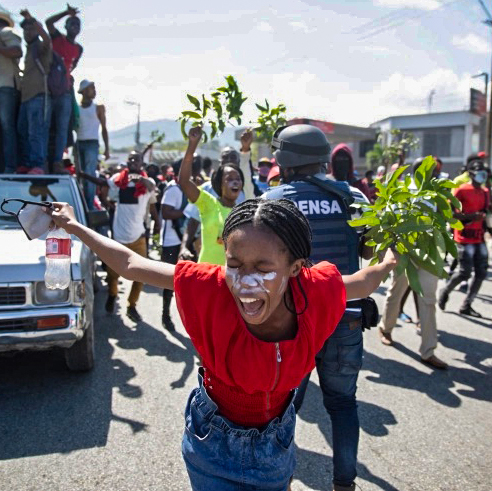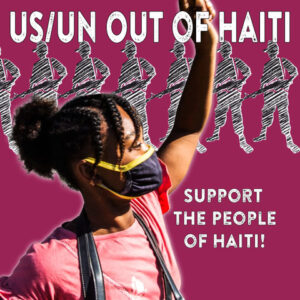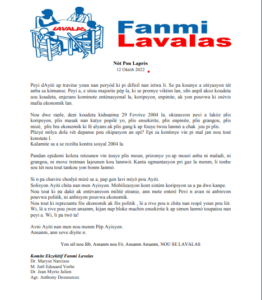by Ann Garrison, published in Black Agenda Report 19 July 2023
Haitians protest oligarchic rule, UN occupation, and foreign military “intervention.”
 The US and Canada have been arguing for a multilateral military intervention in Haiti led by the army of a third country, possibly even Rwanda, to support the puppet regime that they installed. They are using “gang violence” as the racist excuse, but there are actually more gang killings in Jamaica. In fact, the people of Haiti have been protesting in the streets to get the UN and the Core Group out of Haiti and get the US to stop supporting the illegitimate, unelected prime minister, Ariel Henry.
The US and Canada have been arguing for a multilateral military intervention in Haiti led by the army of a third country, possibly even Rwanda, to support the puppet regime that they installed. They are using “gang violence” as the racist excuse, but there are actually more gang killings in Jamaica. In fact, the people of Haiti have been protesting in the streets to get the UN and the Core Group out of Haiti and get the US to stop supporting the illegitimate, unelected prime minister, Ariel Henry.
I spoke to Haiti Action Committee activist Seth Donnelly, a public school teacher who has traveled to Haiti over 20 times since the 2004 coup that removed President Jean-Bertrand Aristide.
ANN GARRISON: Seth Donnelly, can you tell us what you see going on in Haiti?
SETH DONNELY: Yes, absolutely. The current situation is one of a neocolonial dictatorship, installed primarily by the United States, under the UN occupation.
AG: That’s the UN mission that the UN Security Council renewed on July 14, right? Not the foreign military force that the US and Canada are pushing for.
SD: Right. So since the US-orchestrated coup in 2004 against President Jean-Bertrand Aristide and hundreds of other democratically elected officials at all levels, Haiti has been under occupation. And within that context, in 2011 the US installed the current regime that is in power in Haiti, that of the Haitian Tèt Kale Party (PHTK).
When I say installed, there’s extensive evidence that Hillary Clinton, the Secretary of State, literally intervened , went to Haiti and maneuvered Michel Martelly into power after US-sponsored elections that were already fraudulent, given that the the largest political party in the country, Fanmi Lavalas, wasn’t allowed to participate.
Martelly is like the godfather of the PHTK, a very right-wing powerbroker connected to the Haitian oligarchy. He handpicked a successor, Jovenel Moise, who took power after more fraudulent US-sponsored elections in 2016.
Readers may know that Jovenel Moise was then assassinated in the summer of 2021. Based on the evidence that keeps being unearthed, this was quite possibly a US-backed assassination involving elements within the PHTK, including the current US-backed, unelected prime minister, Ariel Henry.
So under this current Ariel Henry regime, we have seen a proliferation of massacres carried out by the police and what US media calls gangs. They’re more accurately understood as paramilitaries, heavily armed paramilitaries, many of which work closely with the police, such as the G-9 Federation, led by the ex-police officer, Jimmy Chérizier, popularly known as “Barbecue.” A few notorious examples of such massacres include the 2018 Lasalin massacre (see this video ) and the 2019 massacres in the Tokyo and Site Vensan (Cite Vincent) neighborhoods. The Harvard Law School International Human Rights Clinic documented this pattern in its 2021 report “Killing with Impunity: State-Sanctioned Massacres in Haiti.”
These paramilitaries and the police have laid siege to popular neighborhoods of resistance to the regime. They’ve destroyed them, burned down houses, and massacred men, women, and children.
AG: And what has the International Monetary Fund been doing amidst all this?
SD: The PHTK regime has loyally implemented IMF dictates. For example, removing the fuel subsidy . And that has resulted in cost-push inflation, which has created the worst hunger crisis in Haiti in many generations. Over half the population is now suffering from extreme food insecurity and malnutrition. Children are once again eating mud cookies. By March 2023, a record 4.9 million people were experiencing acute hunger, nearly half the population. Haiti’s food inflation is among the highest in the world, increasing by 48% between February 2022 and February 2023.
AG: There haven’t been any recent elections, have there?
SD: There’s not a single official legitimately left in office, because the regime is incapable of holding free and fair elections. All formerly elected officials are legally termed out.
So this is the situation in which the Biden administration is arguing for yet another “intervention,” which is really more of an invasion, as if that’s the solution. It’s akin to pretending that the arsonists will put out the fire they started.
AG: Canada too, right? Both US and Canadian mining companies are heavily involved in Haiti.
SD: Right. Canada too, and that’s clearly one of the main reasons the US and Canada have both been pushing this intervention.
AG: And what about the Haitian people?
SD: The Haitian people have been out in the streets protesting the idea of a foreign intervention. Operating at the base of the mass movement of the poor majority is Fanmi Lavalas, the most significant political party in Haiti, which has consistently been the target of US-backed political repression and terror. The mass movement demands that there be no foreign intervention. The Haitian people are struggling today to complete the revolution of 1804, to affirm their right to self-determination, to dismantle this hated neocolonial regime, and install a genuine transition government .
So that’s where we’re at, and the Biden administration has doubled down in supporting the government, despite opposition from even some Democrats in Congress. Biden and Secretary of State Antony Blinken continue to treat Ariel Henry as if he’s a legitimate leader that needs to be at the table for negotiations. They continue to fund the police hand over fist despite massive evidence that the police are linked to the gangs and paramilitaries.
AG: Biden has been mercilessly deporting Haitians too, hasn’t he?
SD: Biden has deported more Haitians than the last three presidents combined. That’s Trump, Obama, and Bush Jr.
Haitians are fleeing hunger and violence, and if they make it to the US/Mexico border, they’re rounded up en masse, as we saw in the photos of the US Border Patrol chasing refugees, border patrol agents on horses using the reins as whips.
So this is an absolute humanitarian disaster. It’s arguably the worst human rights crisis in the Americas. And it’s made in the USA.
AG: What about Biden’s support for the police?
SD: The police in Haiti are deeply connected to the repression and to the massacres, as well as targeted killings of journalists. There’ve been a lot of journalists, independent journalists, killed by the police. For example, on October 30th, 2022, police shot an unarmed journalist , Romelo Vilsaint , in the head, and killed him during a protest at the Delmas police station where he and other journalists were demanding the release of a jailed colleague, Robest Dimanche. Police had previously detained Dimanche when he was covering a street protest.
And we can contrast the Biden administration support for the police with how the administration sanctioned the Cuban police after a relatively minor crackdown in Cuba after the protests in July 2021. I think there may have been one fatality in that, whereas in Haiti, the police killings are epidemic, and all the US does is shower them with more money.
AG: The news is reporting that there are only 9000 police in Haiti, and more are needed. This proposed international intervention is supposed to help them. I don’t think those pushing it are likely to get it past the Security Council, and they know that, so they’re talking about some sort of multilateral force organized and sent in without UN Security Council approval.
SD: Right. One of President Aristide’s greatest accomplishments— before the second US-backed coup d’état in 2004—was to dissolve the Haitian military. The military had been a backbone of US control during the Papa Doc and Baby Doc dictatorships throughout the 20th century.
President Aristide instead sought to develop a small, professional police force, with training from countries such as Switzerland, that could protect, rather than terrorize, the Haitian people. Since the 2004 coup, the US has supported the reintegration of former military and death squad elements back into this police force, funding its transformation once again into an agent of terror.
The narrative being put out in the US media, and by the US and Canadian governments and UN Secretary General Antonio Guterres—who is very much involved in this occupation—is that the police are outgunned by the “gangs” and that the police need more equipment and weapons and training and the support of foreign intervention.
What that narrative misses is that the police are heavily weaponized against the people, and overwhelmingly, at very high levels of command, working with the paramilitaries to terrorize the population.
AG: How are people on the ground resisting all this?
SD: There was an interesting development that started this past spring. The population rose up against the paramilitaries or “gangs” who had been occupying their neighborhoods. This became known as the “Bwa Kale” movement. And then, within a matter of weeks, the population brought the level of violence and the kidnappings down dramatically.
This did involve violence by ordinary people who have just been pushed to the brink, but what Bwa Kale shows you is that when the people organize at a base level, they can tackle the problem of insecurity. So clearly funding the police is not working to bring down crime. What brings down crime is people taking power.
AG: What sort of privilege is the regime getting from being in power?
SD: Well, first, it’s your classic neocolonial regime, in the most direct sense that it was literally installed by the US. Hillary Clinton, who, like I said, maneuvered the first PHTK leader, Martelly, into power, so there’s that classic architecture of colonialism.
Second, Haiti is mineral rich. It’s got bauxite. It’s got petroleum, gold, and more. Because of the racism in the US media and the ignorance it inflicts, Americans are always asking, “Oh, why is Haiti so poor?” but Haiti is not poor. Haiti is resource rich. It’s just the most plundered country in the Americas, similar to the Congo.
The regime has even been trying to change the mining law to give it more power. As it is now, the parliament has to approve mining concessions, but the PHTK regime wants to make that an executive decision, so that gold mining companies from Canada and the United States can just come in without having to go through Parliament.
Regime officials also accumulate wealth by:
- Engaging in pervasive corruption and the massive looting of public funds .
- Perpetuating land grabs and the dispossession of Haitian farmers , including by former PHTK President Jovenel Moise himself to enlarge his personal banana republic .
There’s tremendous pocketing of public monies by high level PHTK officials. Hence what they call the PetroCaribe scandal , provoking huge street protests in 2018.
There are linkages between this regime and the small number of families that dominate the import/export businesses, including organized crime, in Haiti. That’s most likely why Jovenel Moise was killed. He was probably stepping on the wrong toes.
So there are a lot of economic advantages to the regime, and I’m sure that filters down to various levels of the police force, who are getting paid off and protected from paramilitary violence by working with the paramilitaries.
AG: Are there any decent police?
SD: There are officers who are dedicated to protecting the population, but many of them have been killed. There’ve been police protests against the PHTK regime by police officers who say they’re being set up to be killed because the government and the PHTK are working with the paramilitaries.
AG: Okay, so you say there’s a lot of resource extraction going on. It’s just not benefiting the people. And this means gold, petroleum, and various minerals, including bauxite?
SD: Yeah. It would be good to do the type of research that folks have been doing since the coup in Peru against Castillo—looking at the mining concessions under the current regime in Peru.
AG: I’ve seen in the Congo that studying and reporting on mining concessions can be a good way to get yourself killed.
SD: I’m sure but I know folks have been doing that research in Haiti.
And in addition to the mining there are of course the free trade zones for exploiting Haitian labor. The Clintons funded the construction of this big free trade zone in the north of Haiti, the Caracol Industrial Park for textiles that led to a lot of land grabbing .
AG: When you say the Clintons, do you mean the Clintons operating through various NGOs or Bill Clinton when he was president?
SD: No, I mean, more recently, the Caracol Industrial Park was backed by Secretary of State Hillary Clinton and funded by the Obama Administration. When Bill Clinton was president he likewise pushed the neoliberal policies onto Haiti that led, among other things, to the destruction of Haiti’s domestic rice production.
AG: In this context, I think we should note that Hillary Clinton’s brother Tony Rodham was put on the board of a corporation that was then given a Haitian gold mining lease.
SD: Yes.
AG: And not because he knows anything about gold mining.
SD: I don’t think many people in this country adequately grasp the sheer criminality of the Clintons in particular. The Clintons, as instruments of US imperialism in Haiti, have been very destructive in so many ways, going all the way down to the trailers that were sent to supposedly house people after the 2010 earthquake. The Clinton Foundation installed trailers that were sent from New Orleans and that were contaminated with formaldehyde.
AG: OK, let me try to summarize the layers of conflict you’ve been describing here. The US, which represents various resource extractivist industries and individuals, put an oligarchic regime in power. This oligarchic regime is using the police and some of these paramilitary gangs to control the people amidst all this spiraling violence and chaos while the US and Canada are both doubling down in their support for it. There are various police, paramilitary, criminal and oligarchic elements competing for power. And at the same time you have a popular uprising being repressed by the oligarchy, the police, the paramilitary “gangs,” and the UN occupation, which could soon expand to further “multilateral intervention” backed by the US and Canada.
SD: That’s it in a nutshell.
AG: Lastly then, could you tell us some more about the popular movement and the role that Jean-Bertrand Aristide is still playing in it?
SD: Lavalas refers to the mass, grassroots movement of workers, peasants, street vendors, students, and other sectors that successfully toppled the Baby Doc Duvalier dictatorship and created the conditions for the free and fair elections of 1990 that led to the landslide victory of President Aristide. In Kreyol , Lavalas means flood, the idea being that each of us is a drop of water and that when we unite, we become a flood. The Lavalas movement and its political party, Fanmi Lavalas, remain the most potent political forces on the ground today in Haiti. The Haitian people have not forgotten the very real achievements in education, healthcare, housing, food production, and human rights when Lavalas was in power prior to the last coup.
Fanmi Lavalas candidates have dominated in every free and fair election, thus the 2004 coup and political exclusion and repression ever since under US domination. Despite this, President Aristide returned to Haiti from exile in South Africa in 2011, against the opposition of President Obama. Since his return to Haiti, he has, with international solidarity , reopened and expanded UNIFA , a flagship university—with medical, legal, engineering, and agronomy schools—that provides education to those otherwise unable to access it. UNIFA is a beacon of hope today in Haiti and a symbol of the new Haiti that the masses of the people in the street are struggling to build.
Ann Garrison is a Black Agenda Report Contributing Editor based in the San Francisco Bay Area. In 2014, she received the Victoire Ingabire Umuhoza Democracy and Peace Prize for her reporting on conflict in the African Great Lakes region. She can be reached at ann(at)anngarrison.com. Please help to support her work on Patreon .
Seth Donnelly is a public school teacher who has been to Haiti more than 20 times since the 2004 coup that removed President Jean-Bertrand Aristide. He is also the author of “The Lie of Global Prosperity: How Neoliberals Distort Data to Mask Poverty and Exploitation ” from Monthly Review Press.

